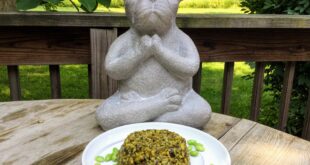
By Jakeb Brock
We come to the spiritual path from many different angles and for many different reasons. But for most of us, there was a hunger for something more than the well-defined life that was laid out for us when we were young — the life that our society and culture told us was “normal” and most satisfying. As this hunger in us persisted (and we did not feel satisfied), we then began to feel an attraction to some of the alternative lifestyle choices that were available. We saw that many people from all walks of life had embraced these various alternatives with dedication and conviction. And this made us curious to explore some of them on our own.
Many people probably experienced a good deal of doubt and fear at this stage, wondering what was wrong with them and asking themselves: Why can’t I just be satisfied with the normal way of living? Why am I being drawn to “fringe” alternatives? What’s wrong with me? In order to have begun our explorations in earnest, we first needed to muster the strength and courage to proceed.
Then there was the dilemma of choosing which spiritual path that we felt best suited us. Thus, our exploration morphed into experimentation as we tried one tradition after another. Meanwhile, during this experimental stage, we were learning more about spiritual life in general, as well as more about ourselves.
Finally, we came upon a tradition that felt so right to us that it stuck. We abandoned our experimental agenda and committed ourselves to one teaching and one spiritual practice. Thus, we put down roots and began to grow according to that particular tradition’s format.
For many of us, this stage of growth and commitment was a special time, in which we experienced a degree of enlightened consciousness for the first time. It was somewhat like a honeymoon, and our eyes were filled with love. We might have had the sense of having “come home” at last – causing a strong conviction that spiritual life is the right life for us. We envisioned the remainder of this lifetime being characterized by purpose, goodness, and fulfillment.
But as the honeymoon gradually gave way to a more realistic view of things, some of us were in for a rough ride. We began to see that the tradition we had so wholeheartedly embraced was not perfect after all. It had flaws and inconsistencies. It had teachers and leaders who were not as holy and pure as they professed. It had practitioners whose motives were not always upright. Disillusionment and resentment took hold of us. Doubt and self-chastisement soon followed suit. “I committed my life to this path,” we lamented. “How could I have been so naïve and stupid?”
Taking inventory of the spiritual growth that had taken place in us during our time with this community, we then had to decide what to do next. If minimal real growth had occurred, we might have felt tempted at this point to leave the spiritual path altogether and return to a more conventional lifestyle. But if true spiritual growth and consciousness expansion had accompanied our experience, we did not even consider it an option to abandon our overall spiritual quest. Though the bathwater had been shown to be a little muddy, we did not let the baby slip down the drain with it. Rather, we held fast to our gain and tried our best to move forward.
As painful as this experience can be, it also has a positive side. For, it tends to reconnect us with our original spiritual attraction and inclination, and get us back on ourpath. In other words, it forces us to realize that spiritual life is not essentially about any particular tradition. It is about us. It is about our own state of consciousness. The traditional path we had been on (and all traditional paths for that matter) are not the goal. They are only the vehicles that take us down the road to spiritual fruition.
From this time forward, we — who felt convinced that the spiritual life is the right life for us — approach things a little differently. We may still seek to associate ourselves with a traditional path, but we do so without the naïve expectation that it is flawless. We cease to identify so strongly with it and now see that our own spiritual growth must always be our number one priority. In a way, we become like spiritual-free agents. But I prefer to look at it as having become a realist and a universalist.
For what we begin to see is that all spiritual traditions and practices have value and point to the same goal. None are perfect, but all have edifying elements. Therefore, it is up to us to sift through the murky waters and glean the pearls from each tradition without getting bogged down with all the human stuff.
There is only one true spiritual life and only one true path. And each of us, if we are sincere, is on that path. We may use different terminologies and hold to diverse imagery. We may get sidetracked and take a detour once in a while. We may lose our perspective and imagine that our tradition or path is the only “right” one. We may become intolerant of others who hold to a different practice. But none of this means that we are not on the one path. All it does is expose our immaturity.
The one true spiritual path is a universal one. It is inclusive of all the edifying aspects found in all traditions and exclusive of none. And it is no respecter of persons. The only requirement for being on this universal path is to be a human being. There are no racial, cultural, or economic barriers.
We may feel loyal to a certain tradition, but in the end, we always go home alone. In other words, the true spiritual path does not have its source “out there.” It is inside of us. Spiritual consciousness is a part of our species’ created makeup. We all have it, and in each one of us it is the same — made of the same stuff. It is Spirit. And Spirit knows no barriers. It is also perfectly pure and holy. Only the human aspects of our makeup draw lines of judgment, exclusivity, and division. This is why all traditions stress the need to strengthen and expand the purely spiritual part of our nature, while renouncing and denying the strictly carnal aspects. This is the journey we are all following. And it is the same for each of us.
Furthermore, as we progress on this journey, there is a state of consciousness we can attain to wherein judgment, hate, and exclusivity cease to be a part of our persona. But we only arrive at that point by doing the inner work of strengthening our spiritual Self and completely renouncing our carnal self. And the more of us who attain this state of consciousness, the more our world will reflect that light. This is not a fantasy. It is what every true spiritual master that has ever lived among us demonstrated and taught. That is why we say that they came teaching love. What is love? It is the attaining of the state of consciousness, in which there is no longer any sense of duality or separation – no separation from God, nor from our fellowman, and not from the entire created universe.
But clearly mankind is still a work in progress. That is why all of our traditions have flaws and imperfections. We simply have not done the inner work yet. But universalism is a truth whose time has come. How can we know this? Because more and more of us are doing the work that leads to enlightenment. We may have begun this journey as an alternative to society’s prescribed route, but along the way we discovered that spiritual life is the true life, while society’s reality is the dream (not to mention that it is not a very pleasant dream). But with all society’s kowtowing to the carnal aspects of our nature, it has become more of a nightmare than a dream.
But we must keep going. We must go further. We must gain the revelation of universalism. This is the next beacon of light for us to take into our hearts. Too many of our spiritual traditions have persisted in their promotion of exclusivity and division. They have refused to come into the light of universalism. But as more and more individuals accomplish this, these archaic flawed traditions will conform to the light or go the way of all dinosaurs.
The world of men has tarnished the testimonies of our great spiritual masters by institutionalizing their teachings and building religious edifices around them. They are exclusive, dogmatic, and divisive. Even some of our non-religious traditions have taken on exclusive overtones. All of this must cease.
Those who are following the one true path of consciousness enlightenment often find these flawed institutionalized traditions to be too confining and hurtful. Spiritual people do not tend to be impervious and thick-skinned. They are not a strong people according to the world’s standard of strength. Rather, they are a sensitive and vulnerable people. Jesus called them the poor in spirit, the meek and downtrodden. But he also said that the meek will inherit the earth. So the dinosaurs that are still rejecting universalism will eventually go the way of extinction.
What does exclusivity have to do with the pure light of spiritual realization? It is not only an inconsistency that plagues many of our traditional paths; it is an affront against those who are truly seeking the light. It is an extremely hurtful behavior found in all human social circles. And as such, it has caused more than a few to turn away from the path altogether.
We must each embrace universalism within our hearts as the outgrowth of our spiritual consciousness development. But spirituality is also a communal phenomenon. How nice it would be if our spiritual communities reflected this goodness and became sanctuaries of not only growth, but also of comfort. But this cannot happen until we gain this revelation as a collective.
This is not as difficult as it sounds. Spiritual revelation is as easy as switching on a light fixture. We can do it. And when we do, something truly amazing will happen on the worldwide spiritual scene. All of the exclusive traditions will dissolve. All human barriers will become passé. There will be one universal spiritual path, one universal spiritual teaching, and one very large universal conscious community.
Jakeb Brock is a spiritual teacher and the author of The New Consciousness: What Our World Needs Most. Visit www.ournewconsciousness.com or www.facebook.com/thenewconsciousness.
 Conscious Community Magazine Dedicated to Elevating Consciousness
Conscious Community Magazine Dedicated to Elevating Consciousness



